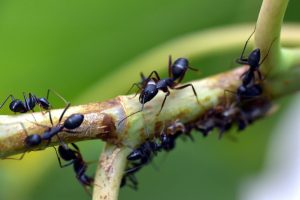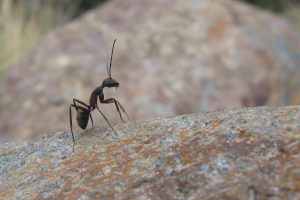Getting rid of ants can be challenging when you don’t know their entry points. These persistent pests invade homes in every season, affecting states like Texas, Arizona, Florida, Missouri, Georgia, and California.
To effectively eliminate them, use strategic methods that work across all USDA Planting Zones.Ants leave scent trails that attract more ants, making it crucial to break their pathways.
Targeting both visible ants and hidden colonies ensures long-term control. Below are ten of the best ways to get rid of ants when you don’t know where they’re coming from.
How To Get Rid Of Ants When You Don’t Know Where They’re Coming From?
1. Use Ant Baits
Ant baits effectively get rid of ants by attracting and poisoning them. The slow-acting poison allows ants to carry it back to the colony, eliminating the entire population. This method works in all USDA Planting Zones, including hot states like Arizona and Texas.
Placing bait stations in different areas increases the chances of reaching hidden nests. The bait remains active for weeks, ensuring continuous ant control. Even during winter, bait traps work indoors to get rid of ants in warm environments.
Unlike sprays, baits prevent ants from relocating and forming new colonies. The poisoned bait disrupts their reproductive cycle, reducing reinfestation risks. This method is useful year-round in states like Georgia and Missouri.
Pros:
- Long-lasting control
- Kills entire colonies
- Works indoors and outdoors
- Safe for pets when placed correctly
- Easy to use
- Targets multiple ant species
- Effective in all seasons
Cons:
- Requires patience
- Some ants avoid baits
- Needs regular replenishment
2. Apply Diatomaceous Earth
Diatomaceous earth is a natural way to get rid of ants in all USDA zones. It dehydrates ants by damaging their exoskeletons, killing them within hours. This method works well in dry climates like California and Arizona.
Sprinkling food-grade diatomaceous earth around baseboards and suspected entry points enhances protection. The fine powder sticks to ants, ensuring they carry it back to the colony. Regular application maintains effectiveness throughout all seasons.
Because it’s non-toxic to humans and pets, this method is ideal for households with children. It remains effective even in humid environments like Florida. Applying it in thin layers prevents clumping, maximizing efficiency.
Pros:
- Natural and non-toxic
- Kills ants quickly
- Works in all climates
- Safe for children and pets
- Effective against multiple pests
- No chemical residue
- Easy to apply
Cons:
- Ineffective when wet
- Requires reapplication
- Can be messy
3. Try Vinegar Solution
A vinegar solution helps get rid of ants by erasing their scent trails. Mixing equal parts vinegar and water creates a strong repellent that works in USDA zones nationwide. This method is effective in states like Missouri, Georgia, and Florida.
Spraying vinegar directly onto ants kills them instantly. It also disrupts pheromone signals, preventing other ants from following established paths. Using it regularly keeps ants from returning.
For best results, apply the solution along entry points and countertops. The strong smell fades as it dries, making it a convenient and eco-friendly method. It’s especially useful in kitchens and food storage areas.
Pros:
- Kills ants on contact
- Erases scent trails
- Safe for indoor use
- Non-toxic alternative
- Works in all states
- Affordable and easy
- Doubles as a cleaner
Cons:
- Strong smell
- Requires frequent reapplication
- Does not kill colonies
4. Use Borax and Sugar
Borax and sugar work together to get rid of ants by luring them in and poisoning them. The sugar attracts the ants, while the borax slowly kills them. This method is highly effective in warm states like Texas and Arizona.
Mixing equal parts borax and sugar creates a homemade ant bait. Placing it near ant trails ensures they transport the mixture back to their colony. This technique eliminates both worker ants and the queen over time.
It works well in all seasons, particularly in USDA zones where ant activity remains high. Using small containers for the mixture prevents contamination in food areas. This method provides long-term control when consistently applied.
Pros:
- Kills entire colonies
- Easy to make
- Effective in all states
- Targets multiple ant species
- Affordable solution
- Works year-round
- No harsh chemicals
Cons:
- Takes time to work
- Must be kept away from pets
- Requires monitoring
5. Seal Entry Points
Sealing entry points prevents ants from invading homes. Identifying cracks and crevices helps stop infestations in USDA zones across all states. This method works best as a preventative solution.
Applying caulk to gaps around windows, doors, and pipes eliminates common entryways. Weather stripping doors also helps block ant access. In humid states like Florida and Georgia, sealing small gaps prevents ant problems year-round.
Regularly checking for new openings ensures long-term ant control. This method complements other treatments, reducing the need for chemical solutions. Combining sealing with bait traps maximizes effectiveness.
Pros:
- Prevents new infestations
- Works year-round
- Chemical-free solution
- Reduces the need for pesticides
- Helps with other pests
- Cost-effective
- Simple to implement
Cons:
- Requires effort
- Does not eliminate existing ants
- Needs regular inspection
6. Use Essential Oils
Essential oils help get rid of ants by disrupting their scent trails. Peppermint, tea tree, and lemon oil are highly effective in USDA zones across all states. Their strong aroma repels ants and other pests.
Mixing a few drops with water creates a natural ant spray. Applying it along ant paths and entry points keeps them from returning. This method works well in homes located in states like Texas and Arizona.
Unlike chemical solutions, essential oils are safe for children and pets. They provide a fresh scent while preventing infestations year-round. Regular application enhances their effectiveness.
Pros:
- Natural and safe
- Repels multiple pests
- Pleasant scent
- Easy to apply
- Works indoors and outdoors
- No harmful residue
- Effective year-round
Cons:
- Requires frequent application
- Less effective on large infestations
- Can be expensive
7. Use Boiling Water
Pouring boiling water into cracks and suspected ant nests effectively eliminates entire colonies. This method works best in outdoor areas where ants commonly hide, such as gardens and sidewalks. The extreme heat kills ants instantly and destroys their tunnels.
In warm states like Texas and Arizona, ants thrive in soil and pavement cracks. Boiling water seeps into these areas, cutting off their food supply and shelter. Repeating the process over several days increases effectiveness.
Since boiling water is chemical-free, it poses no risk to pets or children. However, it requires caution to prevent burns or damage to plants. This method is best combined with other treatments for maximum results.
Pros:
- Kills ants instantly
- No chemicals needed
- Destroys nests effectively
- Works in outdoor areas
- Simple and cost-free
- No toxic residue
- Pet-safe
Cons:
- Risk of burns
- May damage plants
- Ineffective for deep nests
8. Sprinkle Coffee Grounds
Used coffee grounds naturally repel ants due to their strong scent and acidity. This method is useful in USDA zones where ants frequently invade homes and gardens. Coffee grounds also improve soil health when applied outdoors.
Sprinkling coffee grounds near entry points and ant trails disrupts their movements. The texture of the grounds makes it difficult for ants to cross, forcing them to relocate. This technique works well in humid climates like Florida and Georgia.
Replacing the grounds every few days ensures long-lasting effectiveness. Since coffee grounds are biodegradable, they provide an eco-friendly pest control option. Combining them with other methods enhances their impact.
Pros:
- Natural and eco-friendly
- Repels ants effectively
- Safe for pets and kids
- Improves soil health
- Works indoors and outdoors
- No harmful chemicals
- Readily available
Cons:
- Requires frequent replacement
- Less effective on large infestations
- Can be messy
9. Keep Surfaces Clean
Maintaining a clean home prevents ants from finding food and shelter. In states like Missouri and California, ants invade homes in search of crumbs and moisture. Regular cleaning removes their food sources and discourages infestations.
Wiping countertops, vacuuming floors, and sealing food containers eliminate attractants. Using citrus-based cleaners adds an extra layer of protection by erasing scent trails. This method is essential for long-term ant control.
Taking out trash regularly and fixing leaks reduces moisture levels, making homes less appealing to ants. Combining cleanliness with baiting and sealing methods ensures the best results.
Pros:
- Prevents infestations
- Works in all homes
- No chemicals needed
- Improves hygiene
- Simple and effective
- Works year-round
- Complements other treatments
Cons:
- Requires consistency
- Does not kill existing ants
- Needs combined approaches
10. Use Cornmeal
Cornmeal acts as a slow-killing bait for ants. When ants eat cornmeal, they struggle to digest it, leading to their death. This method works best when paired with attractants like sugar or honey.
Placing cornmeal near ant trails in warm states like Texas and Arizona increases its effectiveness. Worker ants carry the cornmeal back to their colony, affecting the queen and larvae. Over time, the colony weakens and disappears.
Since cornmeal is safe for pets and children, it provides a non-toxic alternative to chemical insecticides. While it takes longer to show results, it remains an effective long-term solution.
Pros:
- Safe for pets and kids
- Works on entire colonies
- No toxic chemicals
- Easy to apply
- Affordable solution
- Effective indoors and outdoors
- Can be combined with bait
Cons:
- Slow results
- Requires multiple applications
- May attract other pests
How To Get Rid Of Ants FAQs
1. How long does it take to get rid of ants?
Depending on the method, it can take anywhere from a few hours to several weeks to completely eliminate ants.
2. Are natural remedies effective for getting rid of ants?
Yes, natural solutions like vinegar, diatomaceous earth, and essential oils work well in many cases.
3. What attracts ants indoors?
Ants are drawn to food crumbs, sugary spills, and moisture-rich areas like sinks.
4. Can ants return after treatment?
Yes, if entry points are not sealed, ants may return. Consistent maintenance helps prevent reinfestation.
5. Do different ant species require different treatments?
Some methods work for all species, but specific solutions may be needed for aggressive ants like carpenter ants.
6. Are chemical sprays effective?
While sprays kill visible ants, they don’t always eliminate colonies, making baits a better long-term solution.
7. Is it possible to get rid of ants permanently?
Yes, combining multiple strategies such as sealing, baiting, and natural repellents ensures long-term control.
Conclusion
Getting rid of ants requires persistence and the right methods. Whether you live in Texas, Arizona, Florida, Missouri, Georgia, or California, these ten solutions provide effective ant control. Addressing infestations in every season ensures long-term relief.
By using a combination of natural and targeted treatments, you can prevent ants from invading your home.
Each method has its strengths, so choosing the right one depends on your situation. Start today and take action to get rid of ants permanently.
Recent Posts
Winter emergencies often happen when you least expect them, especially when snow traps your vehicle in a parking lot or on the roadside. Choosing the best collapsible snow shovel for car use ensures...
Winter weather can turn sidewalks into dangerous, slippery pathways within hours. Choosing the best snow shovel for sidewalks ensures faster snow removal, improved safety, and reduced physical strain...